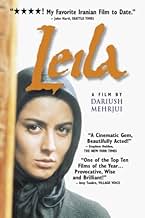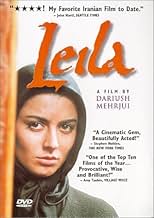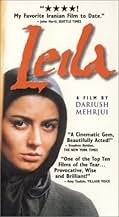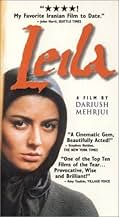IMDb-BEWERTUNG
7,5/10
4314
IHRE BEWERTUNG
Füge eine Handlung in deiner Sprache hinzuThe story of a semi-modern Iranian couple, who are trying to fight the old beliefs and old generation, but is a failing battle because the man is not strong enough.The story of a semi-modern Iranian couple, who are trying to fight the old beliefs and old generation, but is a failing battle because the man is not strong enough.The story of a semi-modern Iranian couple, who are trying to fight the old beliefs and old generation, but is a failing battle because the man is not strong enough.
- Regie
- Drehbuch
- Hauptbesetzung
- Auszeichnungen
- 8 wins total
Empfohlene Bewertungen
this film is indicating a semi modern Iranian couple ,who are trying to fight with old believes &old generation.in this battle they fail cause the man is not strong enough.if you really want to understand this film you must know a lot about Iranian nowadays culture. Leila is the symbol of a young Iranian woman who marry with love but others interferer her life with the name of family traditions and customs.specially her husbands family .at the end of film it shows that every one is damaged by this interference Leila,her husband,mother in law&... the subject is some how strange for westerners,but many of your subjects are strange for easterners too!
This is a touching love story starring a sterile Iranian woman, who has to deal with her in-laws' continuous desire for a grandchild. It is by no means Hollywood-friendly: the story unfolds as it would in real life. It is a perfect example of art imitating life.
The cast is very proficient. Leila does an amazing job of conveying her deep yet veiled anxiety, annoyance and anger every time she speaks to her mother in-law. Sheikhi is equally proficient at making us scorn her. I did feel that Ali Mosaffa stole the show: he is flawless in his role of trying to keep the different protagonists happy, yet staying blind to their actual feelings.
This movie may lose a lot of its punch for non-farsi speakers.
Leila Hatami (Leila, the Wife) - 7/10 - Great when acting, not as great at narrating.
Ali Mosaffa (Reza, the Husband) - 10/10 - Compelling flawless performance.
Jamileh Sheikhi (Reza's Mother) - 8/10 - Successfully makes us shriek every time she speaks.
Dariush Mehrjui - 8/10 - Very good script and good rhythm, though I felt that the movie was unusually dark. I am not sure if this was intended, poor cinematography or my failing TV set.
The cast is very proficient. Leila does an amazing job of conveying her deep yet veiled anxiety, annoyance and anger every time she speaks to her mother in-law. Sheikhi is equally proficient at making us scorn her. I did feel that Ali Mosaffa stole the show: he is flawless in his role of trying to keep the different protagonists happy, yet staying blind to their actual feelings.
This movie may lose a lot of its punch for non-farsi speakers.
Leila Hatami (Leila, the Wife) - 7/10 - Great when acting, not as great at narrating.
Ali Mosaffa (Reza, the Husband) - 10/10 - Compelling flawless performance.
Jamileh Sheikhi (Reza's Mother) - 8/10 - Successfully makes us shriek every time she speaks.
Dariush Mehrjui - 8/10 - Very good script and good rhythm, though I felt that the movie was unusually dark. I am not sure if this was intended, poor cinematography or my failing TV set.
When people speak of Dariush Mehrjui's films what comes. across most often is his ability to paint. complex relationships and emotions without skipping a beat in the film's rythm or pace. Sounds artsy right? But it's true. Leila is a movie with such compassion and tenderness that you can feel. your stomach knot with every event that Leila endures. The film is paced so well and ends so eloquently that (trust me) you don't want to be disturbed by any other sights or sounds for a long time after. Leila is a young iranian girl, in the a social throes, something that she has no choice about. Wish i could summarise the story, but saying anything will give away too much. Especially since the movie is comprised of a series of interlinked events, and any passage of time can only be measured by Leila's everyday agony.
Ingmar Bergman would be proud of this film that enters the soul of an Iranian woman and effects the heart of those who observe. Set in upper-suburbia Teheran where life for Leila takes a turn when she finds herself unable to have children. This has an affect on her marriage caused by outside interference of the family. Leila wants to keep the peace and goes along with the charade of getting her husband a second wife to have children with, a situation that affects everyone. The camera catches the distinct feature of the actors as an over abundance of dialogue takes over. But the dialogue, (with some bad subtitles that is easily overlooked), carries the story onwards while we the audience enter Leila's tormented mind which is the centre stage of this beautifully crafted piece of cinema. Occasionally you want to kick Leila and tell her to get her act together and rebel against her husband's family. But tradition has a hold of her and she remains silent, sending herself into a slow deteriorating state of existence. A tradition that I can almost relate too.
Dariush Mehrjui is one of Iran's finest modern filmmakers, his specialty is making films about relationships among the upper-middle-class illuminati and especially love stories about women. This drama is a very powerful, poignant and mesmerizing love story, about the pressures of dealing with Moslem traditions and of a woman's own sense of being.
A very warm couple, the handsome Reza (Ali Mosaffa) and the beautiful Leila (Leila Hatami), perfectly suited for each other in temperament find happiness in their first year of marriage. Why this marriage should turn ice cold, when everything is so blissful is amazing to watch as it unfolds. This is a truly heartbreaking tale without contrivances that examines a woman's psyche, looking carefully at her wants and her expectations. The trouble starts when after a year, there is no child. The couple visits a doctor and are tested to see if either one has infertility problems. They swear their love for each other and in their own quiet way say that it doesn't matter who is to blame, they will stay married no matter what. The problem comes from Leila's overbearing mother-in-law (Jamileh Sheikhi), a monster if there ever was one. She rattles the poor, sensitive girl and completely intimidates her, stressing how important it is to have a son to carry out the family name. The wealthy Reza, who works in his father's company, is the only son, there are four daughters. When the news from the lab comes back that Leila is barren, that her hormonal levels are too low to ever have children, the mother-in-law heartlessly puts the burden on her -- telling her that she is holding her son back from raising a family.
The weak son never confronts his mother as he seems perplexed, even as his wife begins to slowly sink into a shell, confused and ashamed about herself, unwilling to confide in anyone, not even her mother. She receives passive support from Reza but she can't face the treacherous mother-in-law when alone, who has the gift of twisting things around during her visits while pretending to be nice by bearing gifts and then she turns on her nasty tongue; this makes Leila feel inadequate as she just tries to please her by agreeing with whatever she says. The mother is so invasive of the couple's privacy that she calls them always at the wrong moment and the ringing phone is like a knife sticking Leila in her vulnerable spots. It is so painful to just watch the phone and hear it ringing, and watch Leila cringe at the thought of hearing what her mother-in-law has to say.
The selfish mother-in-law after two years of intimidating the girl by telling her Reza wants a child so much he will sneak behind her back and have a child with another woman, and then to have the nerve to suggest that Leila give her permission for Reza to get another wife. Evidently, polygamy is permitted in Iran.
Reza reacts by saying he doesn't want another wife and that he can live happily without children, just as long as she returns to being the old playful Leila who smiles so easily and is close to him. But he never reassures her that he means what he says and she grows more distant from him talking to herself out loud, so that we could hear her express things that she feels she can't tell anyone else. She can't take the pressure anymore, so she pushes Reza to look for a new wife. On each occasion, when Reza goes courting, he requests that she ride with him to meet his perspective bride as he drops her off by the stores to shop while he goes to look over the woman his Aunt Shamsi or his mother-in-law chose for him.
Reza is never forceful enough in his statements telling her that it doesn't matter that she can't have children, as Leila has nagging doubts about whether he really means it or is just saying it. The couple have all the creature comforts of modern life and are seen playfully watching Dr. Zhivago on TV together, but tradition is also very strong. She stays home and does the cooking and the womanly chores while wearing as she must, by Iranian law, a chador to cover her head. There seems to be no problem following these traditions, but this modern couple has its feet stuck in two different worlds and they seem confused as to where they really want to be standing.
I recently saw another film from the Middle-East, "Kadosh," an Israeli film with the same topic and the same intransigent attitude was displayed by those who call themselves ultra-orthodox believers in God, who believe a woman who is barren has been cursed by God.
This is a very compelling and subtle film, it shows the current conflict in Iran between modernity and Islamic tradition. It is also about the universal problem of love as seen through the psyche of a woman who is stripped of her self-esteem and even though she is beautiful and has a considerate husband, she is still not sure of what her role is in society.
A very warm couple, the handsome Reza (Ali Mosaffa) and the beautiful Leila (Leila Hatami), perfectly suited for each other in temperament find happiness in their first year of marriage. Why this marriage should turn ice cold, when everything is so blissful is amazing to watch as it unfolds. This is a truly heartbreaking tale without contrivances that examines a woman's psyche, looking carefully at her wants and her expectations. The trouble starts when after a year, there is no child. The couple visits a doctor and are tested to see if either one has infertility problems. They swear their love for each other and in their own quiet way say that it doesn't matter who is to blame, they will stay married no matter what. The problem comes from Leila's overbearing mother-in-law (Jamileh Sheikhi), a monster if there ever was one. She rattles the poor, sensitive girl and completely intimidates her, stressing how important it is to have a son to carry out the family name. The wealthy Reza, who works in his father's company, is the only son, there are four daughters. When the news from the lab comes back that Leila is barren, that her hormonal levels are too low to ever have children, the mother-in-law heartlessly puts the burden on her -- telling her that she is holding her son back from raising a family.
The weak son never confronts his mother as he seems perplexed, even as his wife begins to slowly sink into a shell, confused and ashamed about herself, unwilling to confide in anyone, not even her mother. She receives passive support from Reza but she can't face the treacherous mother-in-law when alone, who has the gift of twisting things around during her visits while pretending to be nice by bearing gifts and then she turns on her nasty tongue; this makes Leila feel inadequate as she just tries to please her by agreeing with whatever she says. The mother is so invasive of the couple's privacy that she calls them always at the wrong moment and the ringing phone is like a knife sticking Leila in her vulnerable spots. It is so painful to just watch the phone and hear it ringing, and watch Leila cringe at the thought of hearing what her mother-in-law has to say.
The selfish mother-in-law after two years of intimidating the girl by telling her Reza wants a child so much he will sneak behind her back and have a child with another woman, and then to have the nerve to suggest that Leila give her permission for Reza to get another wife. Evidently, polygamy is permitted in Iran.
Reza reacts by saying he doesn't want another wife and that he can live happily without children, just as long as she returns to being the old playful Leila who smiles so easily and is close to him. But he never reassures her that he means what he says and she grows more distant from him talking to herself out loud, so that we could hear her express things that she feels she can't tell anyone else. She can't take the pressure anymore, so she pushes Reza to look for a new wife. On each occasion, when Reza goes courting, he requests that she ride with him to meet his perspective bride as he drops her off by the stores to shop while he goes to look over the woman his Aunt Shamsi or his mother-in-law chose for him.
Reza is never forceful enough in his statements telling her that it doesn't matter that she can't have children, as Leila has nagging doubts about whether he really means it or is just saying it. The couple have all the creature comforts of modern life and are seen playfully watching Dr. Zhivago on TV together, but tradition is also very strong. She stays home and does the cooking and the womanly chores while wearing as she must, by Iranian law, a chador to cover her head. There seems to be no problem following these traditions, but this modern couple has its feet stuck in two different worlds and they seem confused as to where they really want to be standing.
I recently saw another film from the Middle-East, "Kadosh," an Israeli film with the same topic and the same intransigent attitude was displayed by those who call themselves ultra-orthodox believers in God, who believe a woman who is barren has been cursed by God.
This is a very compelling and subtle film, it shows the current conflict in Iran between modernity and Islamic tradition. It is also about the universal problem of love as seen through the psyche of a woman who is stripped of her self-esteem and even though she is beautiful and has a considerate husband, she is still not sure of what her role is in society.
Wusstest du schon
- Zitate
Leila: God has not given me a child. Instead He has given me the gift of eternal patience and endurance.
- VerbindungenFeatured in White Nights (2003)
Top-Auswahl
Melde dich zum Bewerten an und greife auf die Watchlist für personalisierte Empfehlungen zu.
- How long is Leila?Powered by Alexa
Details
Box Office
- Bruttoertrag in den USA und Kanada
- 5.294 $
- Eröffnungswochenende in den USA und in Kanada
- 5.294 $
- 16. Mai 1999
- Weltweiter Bruttoertrag
- 8.231 $
Zu dieser Seite beitragen
Bearbeitung vorschlagen oder fehlenden Inhalt hinzufügen

























